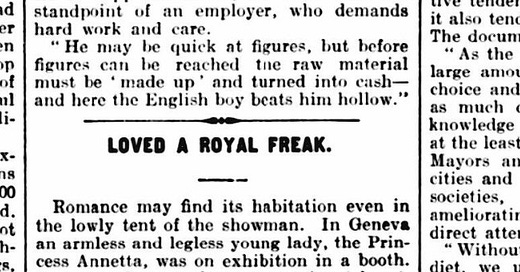Loved a Royal Freak
A romance that is "probably without equal"; PLUS special guest Undine from Strange Company
In August 1907, several British newspapers reported the story of an unusual romance set at a travelling freak show in Switzerland:
A love romance that is probably without equal took place not long ago in the lowly tent of a showman during the fair at Geneva. In the booth was exhibited a girl of 18, armless and legless, but exceedingly pretty, whose show name was “Princess Annetta”. A young German who had gone to stare stayed to admire the pretty face and after numerous visits became so enamoured of it as to forget the other physical defects. He proposed marriage and was accepted. The showman strenuously resisted the loss of his leading “draw”, and the young German laid information against him for exercising duress. That, however, was a slow process, so watching his opportunity, and armed with the necessary license, Romeo carried off his Juliet to the church, where they were at once married, the bridegroom holding the bride in his arms during the ceremony.
One newspaper compared the story to the plot of the Jacques Offenbach operetta La Princesse de Trebizonde, in which a prince falls in love with a waxwork at a travelling fair: “Who, after that, will say that the story of Prince Casimir and the fair Regina in The Princess of Trebizonde is an exaggeration?” The story was widely reproduced under various headlines, including “Strange Love Romance” and “Loved a Royal Freak”.
While the story is very much “of its time” (and, let’s face it, probably untrue), it’s interesting to consider what the current tabloids would have made of it.⧫
Now the Recommended section, with special guest Undine from Strange Company:
Recommended:
Strange Company
History is weird. Strange Company is a long-running blog celebrating the oddities and curiosities that historians generally overlook. So it’s very much brewed from the same teapot as Singular Discoveries. Written by the mononymous Undine, who also Tweets unusual ephemera as @HorribleSanity, Strange Company operates under a maxim of Edgar Allan Poe, who said, “...we should pass over all biographies of 'the good and the great,' while we search carefully the slight records of wretches who died in prison, in Bedlam, or upon the gallows." So Undine brings us tales of unexplained deaths, unusual criminals, paranormal happenings, and all manner of strange newspaper clippings, plus a weekly round-up of fascinating web links. A highly diverting recommendation.
Undine kindly answered a couple of questions:
Paul: Your blog and Twitter feed focus on the type of strange, forgotten stories that are generally overlooked by historians. What do you think these type of stories tell us about the past?
Undine: As I've mentioned several times on my blog, researching these posts has left me convinced that the world is a far more strange and mysterious place than we like to think. I'm constantly discovering stories where completely ordinary people, leading completely ordinary lives, are suddenly plunged into the Twilight Zone: disappearances, mysterious deaths, paranormal experiences, etc. If my blog has a theme, it's that pretty much anything can happen to pretty much anyone.
Paul: Can you recommend something like-minded readers might enjoy and tell us why you enjoyed it?
Undine: Probably my biggest blogging influence has been the books of Edmund Pearson and William Roughead. They largely wrote about true crime, but they occasionally veered into more conventional history. They both wrote about (usually) distasteful subjects with an elegance and wit not often found among crime writers. I would think that anyone who likes my blog would be a much bigger fan of their essays. They did what I'm trying to do — only they did a far better job of it. [Not true!] Pearson's Masterpieces of Murder and Roughead's Classic Crimes are "best-of" collections. They'd probably be the most logical places to start. "Masterpieces" also has a preface dealing with the controversy over Pearson's writings about the Lizzie Borden case. He was so convinced of her guilt that other writers accused him of twisting the facts — intentionally or not — to emphasize his case against her.
You can read more on the Strange Company website and follow @HorribleSanity on Twitter. You can borrow ebooks of both Masterpieces of Murder and Classic Crimes for free from the Internet Archive.
Next time: Oldest Man in World to Play Bowls…
If you enjoyed this post, please share it with friends and followers via email, Twitter, Facebook etc by clicking this button. Thanks very much!
If you don’t already subscribe, please join us. Just click this button — it’s completely free and we’d love to have you on board!
Main sources: Music Hall and Theatre Review, 23 August 1907, Jersey Independent, 14 September 1907 & 26 October 1907.




